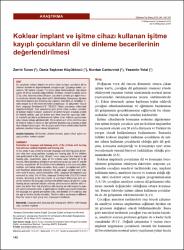Koklear implant ve işitme cihazı kullanan işitme kayıplı çocukların dil ve dinleme becerilerinin değerlendirilmesi
Abstract
Bu çalışmada koklear implant ve işitme cihazı kullanan çocukların dil ve dinleme becerilerini değerlendirmek amaçlanmıştır. Çalışmaya katılan çocukların 18’i koklear implant, 7’si işitme cihazı kullanmaktadır. Çocukların yaşları 43-84 ay arasında değişmektedir. Ortalama implant kullanma süresi 27 ay, cihaz kullanma süresi 39 aydır. Çocukların tamamı aynı eğitim kurumuna devam etmekte olup sözel eğitim almaktadırlar. Konuşmayı algılama becerilerini ölçmek için ilk konuşmayı algılama testi (İKA) ve Hacettepe fonetik dengeli iki ve tek heceli kelimeler kullanılmıştır. Dil gelişimleri “Test of Early Language Development-3” (TELD-3) Türkçe uyarlaması kullanılarak değerlendirilmiştir. Test sonuçlarına göre işitme cihazı kullanan çocuklar ile koklear implant kullanan çocukların dil performansları arasında anlamlı bir farklılık yokken, açık set kelime ayırt etme becerileri açısından koklear implantlı çocukların performansının işitme cihazı kullanan yaşıtlarından daha yüksek olduğu görülmektedir. Dil ve işitsel ayırt etme performansları ile implant kullanım süresi ve aile eğitimine başlama yaşı arasında anlamlı ilişki olduğu bulunmuştur. Her iki grupta performansı ortalamadan farklılık gösteren çocuklar bireysel olarak tartışılmıştır. In this study it was aimed to evaluate language and listening skills of children who were using cochlear implants and hearing aids. Of the children who participated in the study, 18 and 7 were using cochlear implants and hearing aids, respectively. Ages of the children were between 43 to 84 months. Mean durations of implant use and hearing aid use were 27 and 39 months, respectively. All the children were attending to the same education institute, and taking verbal education. Early speech perception test (ESP) and Hacettepe phonetically balanced two and single syllable word tests were used to assess speech perception skills. Language development was assessed by using Test of Early Language Development (TELD-3) Turkish version. According to the test results no significant differences were observed between the language development performances of children using hearing aid and cochlear implant, whereas performance of children with implant was better than that of children with hearing aid with respect to open set speech perception skills. A significant correlation was observed between the language and speech perception skills, and duration of implant use and the age of starting family education. Children with a performance different from the mean in each group were discussed individually.
Source
Gülhane Tıp DergisiVolume
54Issue
2URI
http://www.trdizin.gov.tr/publication/paper/detail/TVRRd05UWXlNZz09https://hdl.handle.net/11421/19577


















